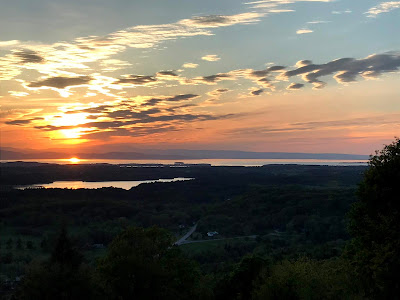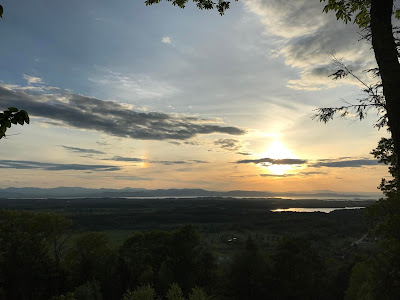May 28.
A rose in a garden.
5 P. M. – To Lupine Hill by boat.
The carnival of the year commencing — a warm, moist, hazy air, the water already smooth and uncommonly high, the river overflowing, and yellow lilies all drowned, their stems not long enough to reach the surface.
I see the boat-club, or three or four in pink shirts, rowing at a distance.
Beech-drops out apparently some days, the old bridge landing at Nawshawtuct; also just out green-briar.
Already the ringing croak of a toad begins to be heard here and there along the river, and the troonk of a bullfrog from time to time.
What is peculiar now, beginning yesterday, after rains, is the sudden heat, and the more general sound of insects by day, and the loud ringing croak of common toads and tree-toads at evening and in the night.
Our river has so little current that when the wind has gone down, as at present, it is dark and perfectly smooth, and at present dusty as a stagnant pool in every part of it; far from there being any murmur, there is no ripple nor eddy for the most part.
Hubbard has plowed up the low-lying field at the bathing place and planted it with potatoes; and now we find that the field we resort to was equally used by the Indians, for their arrowheads are now exposed by the plow.
The sidesaddle-flower conspicuous, but no pollen yet.
The bulbous arethusa out a day or two — probably yesterday. Though in a measure prepared for it, still its beauty surprised me; it is by far the highest and richest color yet. Its intense color in the midst of the green meadow made it look twice as large as reality; it looks very foreign in the midst of our plants - its richly speckled, curled, and bearded lip.
Devil’s needles begin to fly; saw one the 14th.
Thesium just beams now at six o’clock, and the lupines do not look so well for it; their lilac tints show best looking at them towards the sun, for they are transparent. Last night in the dark they were all a pale, whitish color like the moon by day — a mere dull luminousness, as if they reflected light absorbed by day.
Seen from this point now, the pitch pines on Bear Garden Hill, the fresh green foliage of the deciduous trees now so prevails, the pitch pines, which lately looked green, are of a dark brownish or mulberry color by contrast, and the white pines almost as dark, but bluer. In this haziness no doubt they are a little darker than usual.
The grass on pretty high ground is wet with dew an hour before sunset. Whiteweed now, and cotton-grass.
 |
| May 27, 2019 |
For three quarters of an hour the sun is a great round red ball in the west, reflected in the water; at first a scarlet, but as it descends growing more purple and crimson and larger, with a blue bar of a cloud across it; still reflected in the water, two suns, one above the other, below the hilly bank; as if it were a round hole in the cope of heaven, through which we looked into a crimson atmosphere. If such scenes were painted faithfully they would be pronounced unnatural.
May 28, 2017
It is remarkable at how little distance a hillside covered with lupines looks blue, while a house or board painted blue is seen so great a distance.
A sprig of wilted fir now grown an inch emits that rich fragrance somewhat like strawberries and pineapples, yet peculiar.
Mayhew, in his “London Labour and London Poor,” treating of the costermongers, or those who get their living in the streets of London, speaks of “the muscular irritability begotten by continued wande ing,” making one “unable to rest for any time in one place.”
Mentions the instance of a girl who had been accustomed to sell sprats in the streets, who having been taken into a gentleman ‘ s house out of charity, the pressure of shoes was intolerable to her.” “ ut no sooner did she hear from her friends, that sprats were again in the market, than as if there were some magical influence in the fish, she at once requested to be freed from the confinement, and permitted to return to her old calling.”
I am perhaps equally accustomed to a roaming field-life, experience a good deal of that muscular irritability, and have a good many friends who let me know when sprats are in the market.
H. D. Thoreau, Journal, May 28, 1853
Our river has so little current. See July 30, 1859 ("It is a mere string of lakes which have not made up their minds to be rivers. As near as possible to a standstill."); April 16, 1852 ("A succession of bays it is, a chain of lakes, . . .There is just stream enough for a flow of thought; that is all. Many a foreigner who has come to this town has worked for years on its banks without discovering which way the river runs. ")
The bulbous arethusa out a day or two — probably yesterday. Though in a measure prepared for it, still its beauty surprised me; it is by far the highest and richest color yet. See May 30, 1854 ("I am surprised to find arethusas abundantly out in Hubbard's Close, maybe two or three days ... This high-colored plant shoots up suddenly, all flower, in meadows where it is wet walking. A superb flower.”) and note to May 29, 1856 ("Two Arethusa bulbosa at Hubbard’s Close apparently a day or two")
The sidesaddle-flower conspicuous, but no pollen yet. See May 30, 1852 ("The sidesaddle-flowers . . . are just beginning to blossom. The last are quite showy flowers when the wind turns them so as to show their under sides."); June 10, 1854 ("Sidesaddle generally out; petals hang down, apparently a day or two. It is a conspicuous flower."); and note to June 12, 1856 ("Sidesaddle flower numerously out now")
It is remarkable at how little distance a hillside covered with lupines looks blue, See June 5, 1852 ("The transparency of the flower makes its color changeable. It paints a whole hillside with its blue,. . .No other flowers exhibit so much blue. That is the value of the lupine. The earth is blued with them.")
Two suns in the west
reflected in water, one
above the other.
A Book of the Seasons, by Henry Thoreau
"A book, each page written in its own season,
out-of-doors, in its own locality."
~edited, assembled and rewritten by zphx © 2009-2021






No comments:
Post a Comment